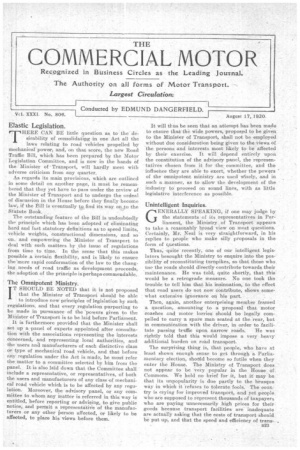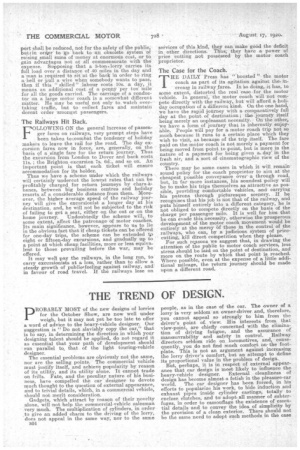Elastic Legislation.
Page 1

Page 2

If you've noticed an error in this article please click here to report it so we can fix it.
THERE CAN BE little question, as to the desirability of consolidating in one Act all the laws relating to road vehicles propelled by mechanical power, and, on that score, the new Road Traffic Bill, which has been prepared by the Motor Legislation Committee, and is now in the hands of the: Minister of -Transport, will hardly meet with adverse criticism from any quarter.
As regards its main provisions, which are outlined in some detail on another page, it must be remembered that they yet have to pass under the review of the Minister of Transport and to undergo the ordeal of discussion in the House before they finally become law, if the Thll in eventually to, find its way on,.-to the Statute Book.
The outstanding feature of the Bill is undoubtedly the principle which has been adopted of eliminating hard and fast statutory definitions as to speed limits, vehicle weights, constructional dimensions, and so on, and empowering the Minister of Transport to deal with such matters by the issue of regulations from time to time. In the sense that this makes possible a certain flexibility, and is likely to ensure the more rapid conformation of the law to the changing needs of road traffic as development proceeds, the adoption of the principle is perhaps commendable.
The Omnipotent Ministry. .
IT SHOULD BE NOTED that it is not proposed that the Minister of Transport should be able to introduce new principles of legislation by such regulations, and that every regulation pm-porting to be made in pursuance of the -powers given to the Minister of Transport is to be laid before Parliament.
It is furthermore provided that the Minister shall set up a panel of experts appointed after consultation with the associations representing the interests concerned,and representing local authorities, and the users and manufacturers of each distinctive class or type of mechanical road vehicle, and that. before any regulation under the Act is made, he must refer the matter to a committee selected by him from the panel. It is also laid down that the Committee shall include a representative, or representatives, of both the users and manufacturers of any class of mechanical road vehicle which is to be affected by any regulation. Moreover, the advisory panel, or any committee to whom any matter is referred in this way is entitled, before reporting or advising, to give public notice, and permit a representatie 'of the manufacturers or any other bergon affected, or likely to be affeoted, to place his views before them. It will thus be seen that an attempt has been made to. ensure that the Wide powers, proposed to be given to the Minister of Transport., shall not be employed without due consideration being given to the views of the persons. and interests most likely to be affected by their exercise. It will depend entirely upon the constitution of the advisory panel, the representatives chosen from it for the committee, and the influence they are able to exert, whether the powers of the' omnipotent. ministry are used wisely, and in such a manner, as to -allow the development of the industry to proceed on sound lines, with as little legislative interference as possible.
Unintelligent Inquiries.
ENERALLY SPEAKING, if one may judge by the statements of its representatives in Par liament, the Ministry of Transport appears to take a reasonably broad view on most questions. Certainly, Mr. Neal is very straightforward, in his replies to people who make silly proposals in the form of questions.
Thus, quite recently, one of our intelligent legislators besought the Ministry to enquire into the possibility of reconstituting turnpikes, so that those who use the roads should directly contribute towards their maintenance. He was told, quite shortly, that this would be a retrograde measure. No one took the trouble to tell him that his insinuation, to the effect that road users do not now contribute, shows somewhat extensive ignorance on his part.
Then, again, another enterprising member framed a question, amounting to a proposal that motor coaches and motor lorries should be legally compelled to carry a spare man seated at the rear, but in communication with the driver, in order to facili tate passing traffic upon narrow roads. He was rightly told that this would impose a very heavy additional burden on road transport.
The surprising thing is, that people, who have at least shown enough sense to get through a Parliamentary election, shoeld become so futile when they enter the House. The Ministry of Transport does not appear to be very popular in the House of Commons. We hold no brief for it, but it' may be that its unpopularity is due partly to the brusque way in which it 'refuses to tolerate fools. The country is crying for improved transport, and yet people who are supposed to represent thousands of taxpayers who are paying unnecessarily high prices for their goods because transport facilities are inadequate are actually asking that the costa of transport should be put up, and that the speed and efficiency of trans„ port shall be reduced, not for the safety of the public, buttin ord,er. to go back to an obsolete system of raising small sums of money at enormous cost, or to gain advantages not at all commensurate with the expense. Supposing that a 3-ton lorry carries its full load over a distance of 40 miles in the day and a man is required to sit at the back in order to ring a, bell or _pull a wire when somebody wants to pass, then if this " skilled" labour costs ids. a day, it means an additional cost of a pennY per ton` mile for all the goods carried. The carriage of a conductor on a large motor coach is a somewhat different matter. He may be useful not only to watch overtaking traffic, but to collect fares and maintain decent order -amongst passengers. .
The Railways Hit Back,
FOLLOWING ON the general increase of passenger fares on railways, yery prompt steps have . been taken to combat the tendency of holiday makers to leave the rail for the road. The day excursion fares now in force, are, generally, on the basis of a single fare for the return journey. Thus the excursion from London to Dover arid back costs its.; the Brighton excursion is. 6d., and so on. .An important point is that each ticket will ensure accommodation for its holder.
Thus we have a scheme under which the railways will certainly undercut the lowest rates that can be profitably charged for return journeys by chars-abanes' between big business centres and holiday resorts aE a considerable distance from them. Moreover, the higher average speed of the railway journey will give the excursionist a longer day at his destination, and, he will not be subjected to the risk of failing to get a seat, either on the out or on the home journey. Undoubtedly the scheme will, to some extent, affect the patronage of motor coaches. Its main significance, however, appears to us to lie in the obvious fact that if cheap tickets can be offered for one-day trips, the scheme can be extended tp eight or fifteen-clay excursions, and gradually up to ' a point at which cheap facilities, more or less equivalent to those prevailing before the war, may be offered.
It may well pay the railways, in the long run, to carry excursionists at a loss„ rather than to allow a steady growth of publicefeeling against railway, and in favour of road travel. If the railways lose on
services of this kind, they can make good the deficit in other directions. Thus they have a power of price cutting not possessed by the motor ooach• proprietor.
The Case for the Coach.
THE DAILY Press has " boosted " the motor coach as part of its agitation against the, in • crease in railway.fareis. In So doing, it has, to some extent, distorted the real case for the motor vehicle. In general, the motor coach will not compete directly with the railway, but will afford a holiday occupation of a different kind-. On the-one hand, • -we have the rapid journey with a comparatively full day at the point of destination; the journey itself being merely an unpleasant necessity. On the other, we have a form of journey that is inherently enjoyable. People will pay for a motor coach trip not BO much because it runs to a certain place which they wish to visit, as because of the trip itself. The fare paid on the motor coach is not merely a payment for being moved from point to point, but is more in the nature of a payment for being given ai day in the fresh air, and a sort of cinematographic view of the country. There may be some cases in which it will remain sound policy for the .00ach proprietor to aim at the cheapest possible conveyance overa through road, but, in far more instances, his soundest policy will be to make his trips themselves as attractive as possible, providing comfortable vehieles, and carrying his patrons through picturesque scenery. If he recognises that his job is not that of the railway, and puts himself entirely into a different category, he is not obliged to compete directly. on the hams of the charge per passenger mile. It is well for him that he can evade this necessity, otherwise the prosperous development of the motor coach movement would be entirely at the mercy of those in the control of the railways, who can, by a iudicious system of pricecutting, kill direct competition when they please. For such reasons we suggest that, in drawing the attention of the public to motor coach services, less stress should be laidon the point of destination, and more on the route by which that point is reached. Where passible, even at the expense of a little additional mileage, the returnjourney should be made upon a different road.




























